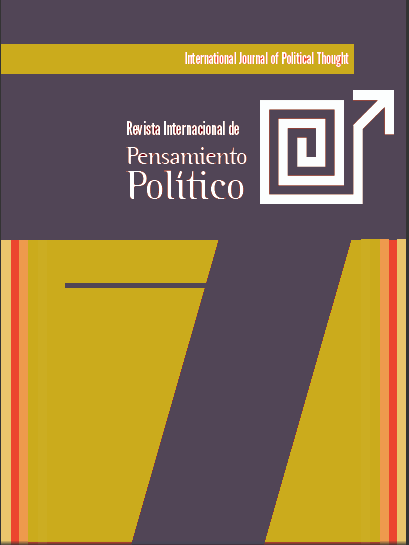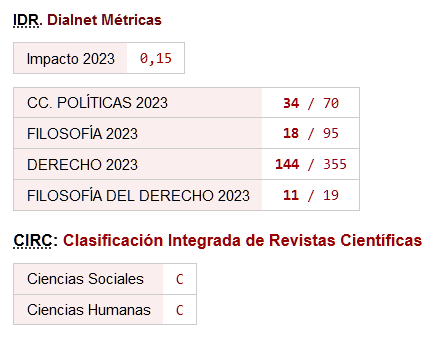Political disaffection
a reconceptualisation proposal
DOI:
https://doi.org/10.46661/revintpensampolit.10941Keywords:
political disaffection, political attitudes, attitudinal change, political culture, political theoryAbstract
Political disaffection has emerged as a central phenomenon in the contemporary political landscape, necessitating a comprehensive and systematic reassessment. In this context, this study proposes a reconceptualization of the term, addressing theoretical and methodological aspects crucially identified through an exhaustive analysis of recent literature.
We explore how emotions play a fundamental role in shaping this attitude, and how understanding them could shed light on the growing political polarization. Our analysis highlights the need to integrate these emotional dimensions into the study, measurement, and analysis of political disaffection, thus providing a more nuanced and comprehensive understanding of this crucial phenomenon in contemporary political science.
Downloads
References
Abad Cisneros, Angélica, y Trak, Juan Manuel. (2013). Desafección política en Bolivia, Ecuador y Venezuela en 2010: un análisis comparado. Cuadernos del Cendes, 30(82), 35-66
Ahmed, S. (2014). Cultural Politics of Emotion. Edinburgh University Press. https://doi.org/10.1515/9780748691142 DOI: https://doi.org/10.1515/9780748691142
Alesina, A., y Wacziarg, R. (2000). The economics of civic trust. En S.J. Pharr & R. D. Putnam (Eds.), Disaffected Democracies. What’s Troubling the Trilateral Countries? (pp. 147–170). Princeton University Press. https://doi.org/10.1515/9780691186849-011 DOI: https://doi.org/10.1515/9780691186849-011
Almond, G A, y Verba, S. (1989). The Civic culture revisited. Sage Publications
Almond, Gabriel Abraham, y Verba, Sidney. (1970). La cultura cívica: estudio sobre la participación política democrática en cinco naciones. Madrid: Euramérica
Bartolomé, Edurne. (2005). El apoyo político y sus condicionantes en perspectiva comparada. En VII Congreso Ciencia Política y de la Administración. AECPA. Democracia y buen gobierno. (pp. 1-14). Madrid: AECPA.
Bloch, E., Plaice, N., Plaice, S., y Knight, P. (1995). The Principle of Hope, Volume 1. MIT Press
Campbell, Sue. (1994). Being Dismissed: The Politics of Emotional Expression. Hypatia, 9(3), 46-65. https://doi.org/10.1111/j.1527-2001.1994.tb00449.x DOI: https://doi.org/10.1111/j.1527-2001.1994.tb00449.x
Clarke, Harold D., Dutt, Nitish, y Kornberg, Allan. (1993). The Political Economy of Attitudes toward Polity and Society in Western European Democracies. The Journal of Politics, 55(4), 998-1021. https://doi.org/10.2307/2131945 DOI: https://doi.org/10.2307/2131945
Clifford, Scott. (2019). How Emotional Frames Moralize and Polarize Political Attitudes. Political Psychology, 40(1), 75-91. https://doi.org/10.1111/pops.12507 DOI: https://doi.org/10.1111/pops.12507
Dalton, Rusell J. (2000). Value change and democracy. En Robert D. Putnam Susan J. Pharr (Ed.), Disaffected Democracies: What’s Troubling the Trilateral Countries? Princeton University Press. https://doi.org/10.1515/9780691186849-015 DOI: https://doi.org/10.1515/9780691186849-015
Downs, A., y Merino, L. A. M. (1973). Teoría económica de la democracia. Aguilar.
Druckman, J., Green, D., Kuklinski, J., y Lupia, A. (2006). The Growth and Development of Experimental Research in Political Science. American Political Science Review, 100(4), 627–635. https://doi.org/10.1017/S0003055406062514 DOI: https://doi.org/10.1017/S0003055406062514
Easton, D. (1967). A Systems Analysis of Political Life. Wiley.
Easton, D. (1975). A Re-Assessment of the Concept of Political Support. British Journal of Political Science, 5(4), 435-457. https://doi.org/10.1017/S0007123400008309 DOI: https://doi.org/10.1017/S0007123400008309
Eckstein, Harry. (1988). A Culturalist Theory of Political Change. The American Political Science Review, 82(3), 789-804. https://doi.org/10.2307/1962491 DOI: https://doi.org/10.2307/1962491
Erisen, C. (2017). Political Behavior and the Emotional Citizen: Participation and Reaction in Turkey. Palgrave Macmillan UK. https://doi.org/10.1057/978-1-137-58705-3 DOI: https://doi.org/10.1057/978-1-137-58705-3
Fernández, Laura, y Morán, María. (2014). Encontrar la cultura: estrategias de indagación para el análisis sociopolítico*. Revista de estudios sociales, 50, 43-56. https://doi.org/10.7440/res50.2014.07 DOI: https://doi.org/10.7440/res50.2014.07
Fernando Jiménez Sánchez. (2016). Los efectos de la corrupción sobre la desafección y el cambio político en España. En La corrupción en España (pp. 49-67). https://doi.org/10.1017/CBO9781107415324.004 DOI: https://doi.org/10.1017/CBO9781107415324.004
Ferrín, Monica, Fraile, Marta, García-Albacete, Gema M., y Gómez, Raul. (2020). The gender gap in political interest revisited. International Political Science Review, 41(4), 473-489. https://doi.org/10.1177/0192512119860260 DOI: https://doi.org/10.1177/0192512119860260
Fraile, Marta, y de Miguel Moyer, Carolina. (2022). Risk and the gender gap in internal political efficacy in Europe. West European Politics, 45(7), 1462-1480. https://doi.org/10.1080/01402382.2021.1969146 DOI: https://doi.org/10.1080/01402382.2021.1969146
Fraile, Marta, y Sánchez-Vítores, Irene. (2020). Tracing the Gender Gap in Political Interest Over the Life Span: A Panel Analysis. Political Psychology, 41(1), 89-106. https://doi.org/10.1111/pops.12600 DOI: https://doi.org/10.1111/pops.12600
Galais, Carolina. (2008). Socialización o contexto? La implicación política subjetiva de los españoles (1985-2006).
Gamson, W. A. (1968). Power and discontent. Dorsey Press.
Inglehart, R. (1991). El cambio cultural en las sociedades industriales avanzadas. Centro de Investigaciones Sociológicas.
Inglehart, R. (1998). Modernización y posmodernización: el cambio cultural, económico y político en 43 sociedades. Centro de Investigaciones Sociológicas.
Inglehart, R, y Welzel, C. (2006a). Modernización, cambio cultural y democracia: la secuencia del desarrollo humano. Centro de Investigaciones Sociol{ó}gicas. Recuperado de: https://books.google.es/books?id=JRWf3u5wP2oC
Inglehart, R, y Welzel, C. (2006b). Modernización, cambio cultural y democracia: la secuencia del desarrollo humano. Centro de Investigaciones Sociológicas.
Inglehart, Ronald. (1971). The Silent Revolution in Europe: Intergenerational Change in Post-Industrial Societies. American Political Science Review, 65(4), 991-1017. https://doi.org/10.2307/1953494 DOI: https://doi.org/10.2307/1953494
Inglehart, Ronald. (1977). The Silent Revolution: Changing values and political styles among Western publics. Princeton: Princeton University Press.
Inglehart, Ronald. (2005). Modernización y cambio cultural: la persistencia de los valores tradicionales. Quaderns de la Mediterrània = Cuadernos del Mediterráneo, (5), 21-32.
Jenkins, Laura. (2018). Why do all our feelings about politics matter? British Journal of Politics and International Relations, 20(1), 191-205. https://doi.org/10.1177/1369148117746917 DOI: https://doi.org/10.1177/1369148117746917
King, David C. (1997). The Polarization of American Parties and Mistrust of Government. En David C. King, Joseph S. Nye, & Philip D. Zelikow (Eds.), Why People Don’t Trust Government (pp. 155-178). Harvard University Press. https://doi.org/10.2307/j.ctv322v3xg.10 DOI: https://doi.org/10.2307/j.ctv322v3xg.10
Klingemann, Hans-Dieter. (1998). Mapping Political Support in the 1990s: A Global Analysis. En Pippa Norris (Ed.), Critical Citizens: Global Support for Democratic Governance. (pp. 31-56). Oxford: Oxford University Press. https://doi.org/10.1093/0198295685.003.0002 DOI: https://doi.org/10.1093/0198295685.003.0002
Lawrence, Robert Z. (1997). Is It Really the Economy, Stupid? En Joseph S Nye, Philip D. Zelikow, & David C. King (Eds.), Why People Don’t Trust Government (pp. 111-132). Harvard University Press. https://doi.org/10.2307/j.ctv322v3xg.8 DOI: https://doi.org/10.2307/j.ctv322v3xg.8
Lijphart, A. (2000). Modelos de democracia: formas de gobierno y resultados en treinta y seis países. Ariel.
Magni, Gabriele. (2017). It’s the emotions, Stupid! Anger about the economic crisis, low political efficacy, and support for populist parties. Electoral Studies, 50, 91-102. https://doi.org/10.1016/j.electstud.2017.09.014 DOI: https://doi.org/10.1016/j.electstud.2017.09.014
Martín, Irene. (2005). Interés por la política y desapego político. En M Torcal, L. Morales, & S. Pérez-Nievas (Eds.), España: sociedad y política en perspectiva comparada. Valencia: Tirant Lo-Blanc.
Meer, Tom W. G. Van Der. (2017). Democratic input, macroeconomic output and political trust. En Handbook on Political Trust (pp. 270-284). https://doi.org/10.4337/9781782545118.00028 DOI: https://doi.org/10.4337/9781782545118.00028
Megías, Adrián. (2018). Desafección política ¿estructura o coyuntura? : un estudio profundo en el contexto actual de crisis. Universidad de Murcia. Recuperado de http://hdl.handle.net/10201/65840
Megías, Adrián. (2020a). Changes in the nature of a decade-long crisis of disaffection. Revista Española de Investigaciones Sociológicas, 169(March), 103-122. https://doi.org/10.5477/cis/reis.169.103 DOI: https://doi.org/10.5477/cis/reis.169.103
Megías, Adrián. (2020b). No es la economía, estúpido. La evolución del perfil del desafecto español pre y postcrisis. Revista Española de Ciencia Política, 52, 85-120. https://doi.org/10.21308/recp.52.04 DOI: https://doi.org/10.21308/recp.52.04
Megías, Adrián, y Moreno, Cristina. (2022a). Political disaffection in Spain’s European neighbours: a stable attitude? Revista Espanola de Investigaciones Sociologicas, 179.
Megías, Adrián, y Moreno, Cristina. (2022b). Political disaffection in Spain’s European neighbours: a stable attitude? Revista Espanola de Investigaciones Sociologicas, 179(September), 103-124. https://doi.org/10.5477/cis/reis.179.103 DOI: https://doi.org/10.5477/cis/reis.179.103
Megias Collado, Adrián. (2018). Desafección Política ¿Estructura o Coyuntura? Un Estudio Profundo en el Contexto Actual de Crisis. Universidad de Murcia.
Miller, Arthur H., y Listhaug, Ola. (1990). Political Parties and Confidence in Government: A Comparison of Norway, Sweden and the United States. British Journal of Political Science, 20(03), 357. https://doi.org/10.1017/S0007123400005883 DOI: https://doi.org/10.1017/S0007123400005883
Mishler, W., y Rose, R. (2001). What are the origins of political trust? Testing institutional and cultural theories in post-communist societies. Comparative Political Studies, 34(1), 30-62. https://doi.org/10.1177/0010414001034001002 DOI: https://doi.org/10.1177/0010414001034001002
Montero, José R., y Torcal, Mariano. (1990). La cultura política de los españoles: pautas de continuidad y cambio. Sistema: Revista de Ciencias Sociales.
Montero, Jose Ramon, Gunther, Richard, y Torcal, Mariano. (1998). Actitudes hacia la Democracia en España: Legitimidad, Descontento y Desafeccion. Revista Española de Investigaciones Sociales, 83, 9-49. https://doi.org/10.2307/40184120 DOI: https://doi.org/10.2307/40184120
Montero, José Ramón Jr, Gunther, Richard, y Torcal, Mariano. (1998). Actitudes hacia la democracia en España: legitimidad, descontento y desafección. Revista Española de Investigaciones Sociológicas, 83, 9-49. https://doi.org/10.2307/40184120 DOI: https://doi.org/10.2307/40184120
Morán, María Luz. (2011). La Cultura Política en España: interrogantes, debates y aportaciones. En UNAM (Ed.), Cincuenta años de la cultura cívica: pensamientos y reflexiones en honor al profesor Sidney Verba (pp. 101-122). México: Instituto de Investigaciones Jurídicas.
Moreno, Cristina, y Seisdedos, Susana Ruíz. (2024). El género en el voto. En Pablo Oñate, José Manuel Rivera, & Carmen Ortega (Eds.), Las elecciones generales de noviembre de 2019 (pp. 173-187). Madrid: Centro de Investigaciones Sociológicas (CIS).
Morlino, Leonardo, y Tarchi, Marco. (1996). The dissatisfied society: The roots of political change in Italy. European Journal of Political Research, 30(1), 41-63. https://doi.org/10.1111/j.1475-6765.1996.tb00667.x DOI: https://doi.org/10.1111/j.1475-6765.1996.tb00667.x
Norris, P. (1999). Critical Citizens: Global Support for Democratic Government. Oxford University Press. https://doi.org/10.1093/0198295685.001.0001 DOI: https://doi.org/10.1093/0198295685.001.0001
Norris, P. (2011). Democratic Deficit: Critical Citizens Revisited. Cambridge University Press. https://doi.org/10.1017/CBO9780511973383 DOI: https://doi.org/10.1017/CBO9780511973383
Nussbaum, M. (2008). Paisajes del pensamiento: La inteligencia de las emociones. Paidós.
Nussbaum, M. (2014). Emociones políticas: ¿Por qué el amor es importante para la justicia? Ediciones Paidós.
Nye, J S, Zelikow, P., y King, D. C. (1997). Why People Don’t Trust Government. Harvard University Press. https://doi.org/10.2307/j.ctv322v3xg DOI: https://doi.org/10.2307/j.ctv322v3xg
Olumsuz, Temel, Kişilerin, Duygular, Karar, Siyasi, y Nasil, Sürecini. (2021). How Do The Main Negative Emotions Affect People ’ s Political Decision Process ? : “Fear, Anxiety And Anger". Journal of Academic Inquiries, 16(1), 16. https://doi.org/10.17550/akademikincelemeler.708916 DOI: https://doi.org/10.17550/akademikincelemeler.708916
Orren, Gary. (1997). Fall from Grace: En Joseph S Nye, Philip D. Zelikow, & David C. King (Eds.), Why People Don’t Trust Government (pp. 77-108). Harvard University Press. https://doi.org/10.2307/j.ctv322v3xg.7 DOI: https://doi.org/10.2307/j.ctv322v3xg.7
Palma, Giuseppe Di. (1970). Apathy and Participation: Mass Politics in Western Societies. New York: The Free Press. Macmillan Company.
Pharr, S J, y Putnam, R. D. (2000). Disaffected Democracies: What’s Troubling the Trilateral Countries? Princeton University Press. https://doi.org/10.1515/9780691186849 DOI: https://doi.org/10.1515/9780691186849
Pharr, Susan J. (2000). Officials’ Misconduct and Public Distrust: Japan and the Trilateral Democracies. En Susan J Pharr & Robert D. Putnam (Eds.), Disaffected Democracies (pp. 173-201). Princeton University Press. https://doi.org/10.2307/j.ctv39x5n8.13 DOI: https://doi.org/10.1515/9780691186849-012
Prokhovnik, R. (2012). Rational Woman: A Feminist Critique of Dichotomy. Taylor & Francis. https://doi.org/10.4324/9780203024485 DOI: https://doi.org/10.4324/9780203024485
Putnam, R. D. (2011). Para que la democracia funcione: Las tradiciones cívicas en la Italia moderna. Centro de Investigaciones Sociológicas.
Sampedro, Víctor, y Lobera, Josep. (2014). The Spanish 15-M Movement: a consensual dissent? Journal of Spanish Cultural Studies, 15(1-2), 61-80. https://doi.org/10.1080/14636204.2014.938466 DOI: https://doi.org/10.1080/14636204.2014.938466
Tajfel, H. (1984). Grupos humanos y categorías sociales: estudios de psicología social. Herder.
Tajfel, H., y Turner, J. C. (1986). The Social Identity Theory of Intergroup Behavior. En S. Worchel & W. G. Austin (Eds.), Psychology of Intergroup Relation (pp. 7-24). Chicago: Hall Publishers.
Torcal, M. (2006). Desafección institucional e historia democrática en las nuevas democracias. Revista SAAP, 2(3), 591-634.
Torcal, M, y Montero, J. R. (2006). Political Disaffection in Contemporary Democracies: Social Capital, Institutions and Politics. Taylor & Francis. https://doi.org/10.4324/9780203086186 DOI: https://doi.org/10.4324/9780203086186
Torcal, Mariano. (2000). Partidos y desafección política. Magazine, DHIAL.
Torcal, Mariano. (2014). The Decline of Political Trust in Spain and Portugal: Economic Performance or Political Responsiveness? AMERICAN BEHAVIORAL SCIENTIST, 58(12, SI), 1542-1567. https://doi.org/10.1177/0002764214534662 DOI: https://doi.org/10.1177/0002764214534662
Torcal, Mariano. (2016a). Desafección Política en España en una perspectiva comparada. En Francisco J. Llera Ramo (Ed.), Desafección política y regeneración democrática en la España actual: diagnósticos y propuestas (pp. 79-115). Madrid: Centro de Estudios Políticos y Constitucionales.
Torcal, Mariano. (2016b). Political trust in Western and Southern Europe. En Handbook on Political Trust (pp. 418-439). Edward Elgar Publishing. https://doi.org/10.1007/978-90-481-8531-3_25 DOI: https://doi.org/10.4337/9781782545118.00037
Torcal, Mariano, y Magalhães, Pedro C. (2010). Cultura política en el sur de Europa: un estudio comparado en busca de su excepcionalismo. En Mariano Torcal (Ed.), La ciudadanía europea en el siglo XXI: estudio comparado de sus actitudes, opinión pública y comportamiento políticos. Madrid: Centro de Investigaciones Sociológicas (CIS).
Valentino, Nicholas A., Brader, Ted, Groenendyk, Eric W., Gregorowicz, Krysha, y Hutchings, Vincent L. (2011). Election night’s alright for fighting: The role of emotions in political participation. Journal of Politics, 73(1), 156-170. https://doi.org/10.1017/S0022381610000939 DOI: https://doi.org/10.1017/S0022381610000939
Valentino, Nicholas A., Gregorowicz, Krysha, y Groenendyk, Eric W. (2009). Efficacy, emotions and the habit of participation. Political Behavior, 31(3), 307-330. https://doi.org/10.1007/s11109-008-9076-7 DOI: https://doi.org/10.1007/s11109-008-9076-7
Van Erkel, Patrick F. A., y Van Der Meer, Tom W. G. (2016). Macroeconomic performance, political trust and the Great Recession: A multilevel analysis of the effects of within-country fluctuations in macroeconomic performance on political trust in 15 EU countries, 1999-2011. European Journal of Political Research, 55(1), 177-197. https://doi.org/10.1111/1475-6765.12115 DOI: https://doi.org/10.1111/1475-6765.12115
Villoria, Manuel. (2006). ¿Por qué desconfiamos de los políticos? Una teoría sobre la corrupción de la política. Revista del CLAD Reforma y Democracia, 34, 1-21. Recuperado de: http://www.redalyc.org/articulo.oa?id=357533666002
Weber, Christopher. (2013). Emotions, Campaigns, and Political Participation. Political Research Quarterly, 66(2), 414-428. https://doi.org/10.1177/1065912912449697 DOI: https://doi.org/10.1177/1065912912449697
Wildavsky, Aaron. (1987). Choosing Preferences by Constructing Institutions: A Cultural Theory of Preference Formation. American Political Science Review, 81(1), 3–21. https://doi.org/10.2307/1960776 DOI: https://doi.org/10.2307/1960776
Downloads
Published
How to Cite
Issue
Section
License
Copyright (c) 2024 Adrián Megías

This work is licensed under a Creative Commons Attribution-NonCommercial-ShareAlike 4.0 International License.
Open access policy
Free and open access is allowed to any interested party to all the contents of the journal issues, free of charge, being able to print and transfer all the articles, with the only condition of specifying the source and authorship.
The journal: a) does not charge authorship costs for the processing of articles or for their submission, b) maintains copyright for authors without restrictions, c) facilitates authors to keep their publication rights without limitations.
The International Journal of Political Thought is an original work of the Laboratory of Political Ideas and Practices of the Pablo de Olavide University. All articles included in the Journal are original work of their respective authors. This Journal is freely offered to the scientific and academic community at no cost and releases the contents according to the license "Attribution-NonCommercial-ShareAlike 4.0 CC BY-NC-SA" of the Creative Commons project available in the following url: https://creativecommons.org/licenses/by-nc-sa/4.0/legalcode
If you wish to translate or compile any of the articles available here, please contact us at contacto












 ISSN: 1885-589X
ISSN: 1885-589X  Universidad Pablo de Olavide
Universidad Pablo de Olavide